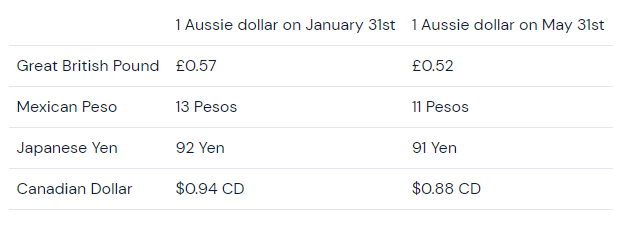This means travelling overseas is getting more expensive.
- The Aussie dollar is depreciating against most major international currencies.
- The AUD is worth less compared to the Yen, Pound, USD, Euro among others
- Our dollar has appreciated compared to Turkey and Argentina, but a currency expert says inflation in those countries likely means holidays there still could be expensive.
Peter Dragicevich Corpay Cross-Border Solutions' currency strategist for the Asia-Pacific region, told the Savings Tip Jar podcast, the Aussie dollar is now weaker against the vast majority of major international currencies.
He said despite a record series of cash rate increases, one of the major drivers of our dollar's poor performance is relatively low interest rates compared to other countries.
"Other central banks have also been raising rates and they've been raising rates more aggressively than the RBA. So those relative differentials are actually moving against the Aussie," Mr Dragicevich said.
Relatively low interest rates tend to depreciate currency, because international investors will increasingly opt for interest yielding products in other countries, where returns are higher.
Mr Dragicevich also said that the slowdown in global growth has been particularly damaging for commodity currencies like the AUD (minerals like iron ore and coal make up a large proportion of Australian exports).
"[Indicators are] all pointing to a pretty sharp slowdown in activity over the next couple of quarters as the high interest rates kind of do their job and constrain people spending and people's investment. And normally in an environment like that commodity prices come under pressure," he said.
So where in particular should holiday makers be aware that their currency conversion might not go as far as they expect?
The United States
According to currency converter XE, an Aussie dollar is currently worth about $0.65USD, the lowest point in more than six months.
As Mr Dragicevich pointed out, as recently as February, the exchange rate was about 72 US cents.
The relative cash rates are likely the biggest factor here, with the US Federal Reserve cash rate currently at 5.25% compared to 3.85% in Australia (although this could climb at next week's RBA meeting).
However, those planning a holiday stateside might just need to postpone, rather than cancel.
"We think that the Aussie probably will stay down at these lower levels, say in the mid 60s, against the US dollar over the next three to six months. But, in 12 months' time, we actually think the Aussie probably will be back up into the low to mid 70s once again," Mr Dragicevich said.
If global inflation cools, the US should be able to lower interest rates, which could weaken the USD and make the AUD relatively stronger.
Euro
Aussies with plans to finally get that European summer will be dismayed to learn that the dollar is currently fetching less than €0.61, compared to more than €0.65 at the start of the year.
NAB's exchange rate forecasts only predict this appreciating to €0.63 by the end of 2025, so those European holidays aren't likely to get much cheaper any time soon.
Tristan Dakin from international money transfer provider Wise shared several tips for holidaymakers looking to cut costs with the Penny for your Thoughts podcast.
He said that since most travel sites used dynamic pricing that fluctuates with demand, booking your flights as early as possible can mean big savings.
"[Prices change] accordingly to fit in with the demand in the market. So you can relieve a lot of the upward pressure on those flat prices just by booking well in advance."
He also stressed the importance of picking an appropriate travel card or currency conversion.
"Never use your bank card overseas, that is the absolute worst thing you can do," Mr Dakin said.
"I would look for a multicurrency card that specifically addresses in a transparent way different fees that you're charged on, [cards that] are designed to reduce those fees."

Avoid the traps of choosing a country with a depreciating currency
As Mr Dragicevich said, the list of currencies the dollar is appreciating against is a short one.
"The Turkish lira, the South African rand, and the Argentine peso are the only ones that really stand out where the Aussie is actually putting on some gains," he said.
However, he also pointed out that these are far from AUD success stories.
"That's more a function of just how weak these other currencies have been for their own mix of factors," he said.
"Argentina and Turkey have been mired in a circular doom loop of an economic currency and confidence crises.
"In Argentina, they've got very weak growth, a huge fiscal deficit, very high inflation. So inflation in Argentina is running north of 100% per annum. There are fears of another debt default.
"In Turkey, very similar situation, but not as extreme. They've had the earthquakes recently, that's hit their economy. And they've been essentially cutting interest rates when they should actually be lifting them to support the currency.
"As the currency falls and weakens, it means their imported prices go up. So inflation actually goes up."
He said people looking for a bargain holiday in Ankara or Istanbul would likely be disappointed.
"The Aussie dollar to Turkish lira is up about 15% from a year ago, but prices in Turkey will up more than that," Mr Dragicevich said.
"It's still very expensive or if you're a traveler that goes to these places semi regularly, you'll probably notice when you hit the ground that things look very expensive compared to what you were used to."
Domestic holiday could still be the best option
Against most attractive and stable currencies, the AUD is weaker. In cases where it's stronger, such as Turkey and Argentina, the inflation crisis could negate any savings.
Mr Dragicevich said a domestic holiday could be the best option at the moment.
"Rather than traveling overseas, because it's so expensive, the lower currency encourages you to stay local, and travel around Australia," he said.
"It actually encourages more travelers from overseas into Australia because it's cheaper for them.
"When I look at the family budget, it's really not the best time to be traveling - particularly not overseas - given how expensive it is. But to support the local economy, it's probably is the best time to travel if you want to travel locally or intersate."
"Is it a good idea to travel overseas with a weak Aussie dollar?" was originally published on Savings.com.au and was republished with permission.
